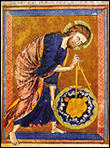Christ's Miracles Manifest Salvific Love
General Audience
Christ's miracles recorded in the Gospels are signs of the divine omnipotence and of the salvific power of the Son of Man. They also reveal God's love for humanity-particularly for those who suffer, who are in need, who implore healing, pardon and compassion. They are therefore signs of the merciful love proclaimed in the Old and New Testaments (cf. Encyclical Dives in Misericordia). Especially the reading of the Gospel makes us understand and almost feel that Jesus' miracles have their source in God's loving and merciful heart which lives and beats in his human heart. Jesus performs them to overcome every kind of evil existing in the world: physical evil, moral evil which is sin, and finally him who is "the father of sin" in human history, namely, Satan.
The miracles are therefore "for man." In harmony with the redemptive finality of his mission, they are works of Jesus which re-established the good where evil had lurked, producing disorder and confusion. Those who accepted them and who were present at them were aware of this fact, so much so that, according to Mark, "they were exceedingly astonished and said, 'He has done all things well. He makes the deaf hear and the mute speak'" (Mk 7:37).
An attentive study of the Gospel texts reveal that no other motive than love for humanity, merciful love, explains the "mighty deeds and signs" of the Son of Man. In the Old Testament, Elijah made use of "fire from heaven" to confirm his power as a prophet and to punish incredulity (cf. 2 Kgs 1:10). When the Apostles James and John sought to induce Jesus to punish with "fire from heaven" a Samaritan village which had refused them hospitality, he definitely forbade them to make such a request. The evangelist mentions categorically that "he turned and rebuked them" (Lk 9:55). (Many codices including the Vulgate add, "You do not know of what manner of spirit you are; for the Son of Man came not to destroy men's lives but to save them.") Jesus never worked a miracle to punish anyone, not even the guilty.
The detail connected with Jesus' arrest in the garden of Gethsemane is significant in this regard. Peter was ready to defend his Master with the sword, and he even "struck the high priest's servant and cut off his right ear. The servant's name was Malchus" (Jn 18:10). But Jesus forbade Peter to use the sword. Indeed, Jesus "touched the servant's ear and healed him" (Lk 22:51). It is a further proof that Jesus did not perform miracles for his own defense. He told his followers that he could call upon his Father for "more than twelve legions of angels" (cf. Mt 26:53) to save him from the enemies who surrounded him. All that he does, even in working miracles, is done in close union with the Father. He does it for the sake of the kingdom of God and of the salvation of mankind. He does it for love.
Thus, at the beginning of his messianic mission, Jesus rejected the devil's suggestions to do "mighty works," for instance, to change stones into loaves of bread (cf. Mt 4:3-4). The power of the Messiah was granted to Jesus not for ostentatious display or vainglory. He who came "to bear witness to the truth" (Jn 18:37), who indeed is "the truth" (cf. Jn 14:6) always worked in absolute conformity with his salvific mission. All his "wonders and signs" expressed this conformity in the framework of the messianic mystery of God which was, as it were, concealed in the nature of a Son of Man, as is shown by the Gospels, especially that of Mark. The miracles nearly always radiated the divine power which the disciples and people sometimes grasped, to the extent that they recognized and exalted Christ as "Son of God." One likewise discovers in them the goodness, sincerity and simplicity which are the most visible qualities of the "Son of Man."
One notes Jesus' great simplicity in the very way he performed the miracles, as well as his humility, tact and delicacy of gesture. This is brought home to us by the words which accompanied the raising of the daughter of Jairus: "The child is not dead but asleep" (Mk 5:39), as if he wished to cloak the significance of what he was about to do. And then "he gave strict orders that no one should know this" (Mk 5:43). He did the same in other cases, for example, after the curing of the deaf mute (Mk 7:36), and after Peter's profession of faith (Mk 8:29-30).
In his healing of the deaf mute it is significant that Jesus took him off by himself "away from the crowd." There "looking up to heaven, he groaned." This "groan" seems to be a sign of compassion and, at the same time, a prayer. The word ephphatha (Be opened!) had the effect of "opening the ears" and removing "the speech impediment" of the deaf mute (cf. 7:33-35).
If Jesus performed some of his miracles on the sabbath, he did so not to violate the sacred character of the day dedicated to God, but to demonstrate that this holy day is marked in a particular way by God's salvific work. "My Father is at work until now, so I am at work" (Jn 5:17). This work is for the good of humanity. Therefore it is not contrary to the holiness of the sabbath, but underlines it: "The sabbath was made for man, and not man for the sabbath! Therefore the Son of Man is lord even of the sabbath" (Mk 2:27-28).
If we accept the Gospel account of Jesus' miracles-and there is no reason not to accept it other than prejudice against the supernatural-one cannot call into doubt a unique logic which links together all those signs and demonstrates their derivation from God's salvific economy. They serve to reveal his love for us, that merciful love which overcomes evil with good, as is shown by the very presence and action of Jesus Christ in the world. Inasmuch as they are inserted into this economy, the "wonders and signs" are an object of our faith in the plan of God's salvation and in the mystery of redemption effected by Christ.
As facts, the miracles belong to evangelical history, and the accounts contained in the Gospels are as reliable as, and even more so than, those contained in other historical works. It is clear that the real obstacle to their acceptance as facts of history and of faith is the anti-supernatural prejudice already referred to. It is a prejudice of those who would limit God's power or restrict it to the natural order of things, as though God were to subject himself to his own laws. But this concept clashes with the most elementary philosophical and theological idea of God-infinite, subsisting and omnipotent Being-who has no limits except in regard to non-existence and therefore the absurd.
One spontaneously notes that this infinity in being and power is also infinity in love. This is demonstrated by the miracles inserted into the economy of the Incarnation and redemption, as "signs" of the merciful love with which God sent his Son into the world "for us men and for our salvation," generous with us even unto death. Sic dilexit! (cf. Jn 3:16).
To such a great love let there not be lacking the generous response of our gratitude, expressed in the consistent witness of our lives.




